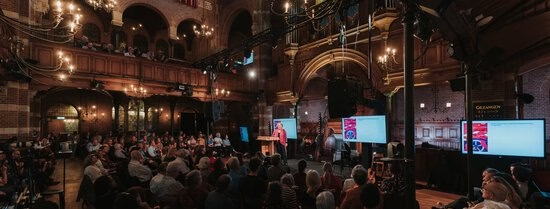The mutual distrust between government and citizens is difficult to resolve. Tine De Moor researches citizen collectives. During the 20th Rotterdam Lecture, she showed what we can learn from the history of these initiatives and what their value is. “Members of citizen collectives experience grip on their lives as a result,” she says.
In Debatpodium Arminius, Tine De Moor (professor of Social Enterprises and Institutions for Collective Action at Rotterdam School of Management) explored the world and value of citizen collectives. How can these initiatives help Rotterdammers?
Rotterdam citizens' collectives
A collective arises when citizens have a need but cannot find a solution through the market or government. Therefore, they form a non-hierarchical group that isn't focused on commercial added value, but on pursuing their common goal.

The world of Rotterdam citizen collectives differ in some ways from the rest of the country. “For instance, in our city there is a much greater emphasis on collectives targeting lower income categories and providing a solution in the social sector. Also, relatively more members in Rotterdam indicate that they join for individual economic benefit,” De Moor observes in research based on data supplied by members of her knowledge platform CollectieveKracht.
History lessons of citizen collectives
Citizens' collectives have been around in our city since the late Middle Ages. These institutions for collective action are the frontrunners of the initiatives we know in our city today. Historical research thereby reveals some salient features of these, which may feel counter-intuitive in today's society, and may help citizens collectives move forward anno today.


It appears, for instance, that past collectives that paid the least attention to sanctions flourished the most. The basis is reciprocity and mutual trust, so punishing non-compliant members does not seem to be fruitful.
Another lesson that can be drawn from studying citizen collectives over the centuries is that it does not necessarily pay to be concerned only with one's own interest, but that it pays off to build strong ties with other collectives, in the same neighbourhood, for instance, or collectives that share the same goal. Thus, such a group becomes more resilient: a matter of self-preservation.

The value of collectives and science
Besides showing policymakers what is needed in a neighbourhood, and sometimes even leading to legislation, there is another positive effect that can be attributed to citizen collectives. Tine De Moor: “In our research, we see that citizen collectives offer members grasp. This is because people experience more control over the living environment and ownership over decision-making. It is known that a sense of grasp reduces social discomfort.”
Erik Jan Poldervaart of residents’ association De Kleine Burg, a tiny-house project from Rotterdam-Zuid, told the audience that they would benefit greatly from scientific knowledge on the subject to take their collective to the next level. Tine De Moor therefore urged people not to be afraid to participate in research: “Cooperation with science is essential. Knowledge based on experience is incredibly valuable to us. Please share it above all!”

Lifelong Learning Festival
The Rotterdamlezing is an annual gift from Erasmus University Rotterdam and the Erasmus Trust Fund to the city, with an extra special touch this year: it is the start of the Lifelong Learning Festival, in which scientists from our university go out into the city throughout the whole week to talk to Rotterdammers about research topics that concern them.
“It is no coincidence that for years, and especially in this anniversary year, we have been going out into the city and entering into dialogue with the people of Rotterdam,” Rector Magnificus Annelien Bredenoord said in her opening speech. She too emphasised that a university is there for society and the mutual connection with society is indispensable in this: “Only by entering dialogue with the people, organisations and bodies that are affected can we pick up where issues lie and really see where we can add value as academics. Because we need many more types of knowledge than the scientific alone to really make a difference.”
- Professor
- Related content

